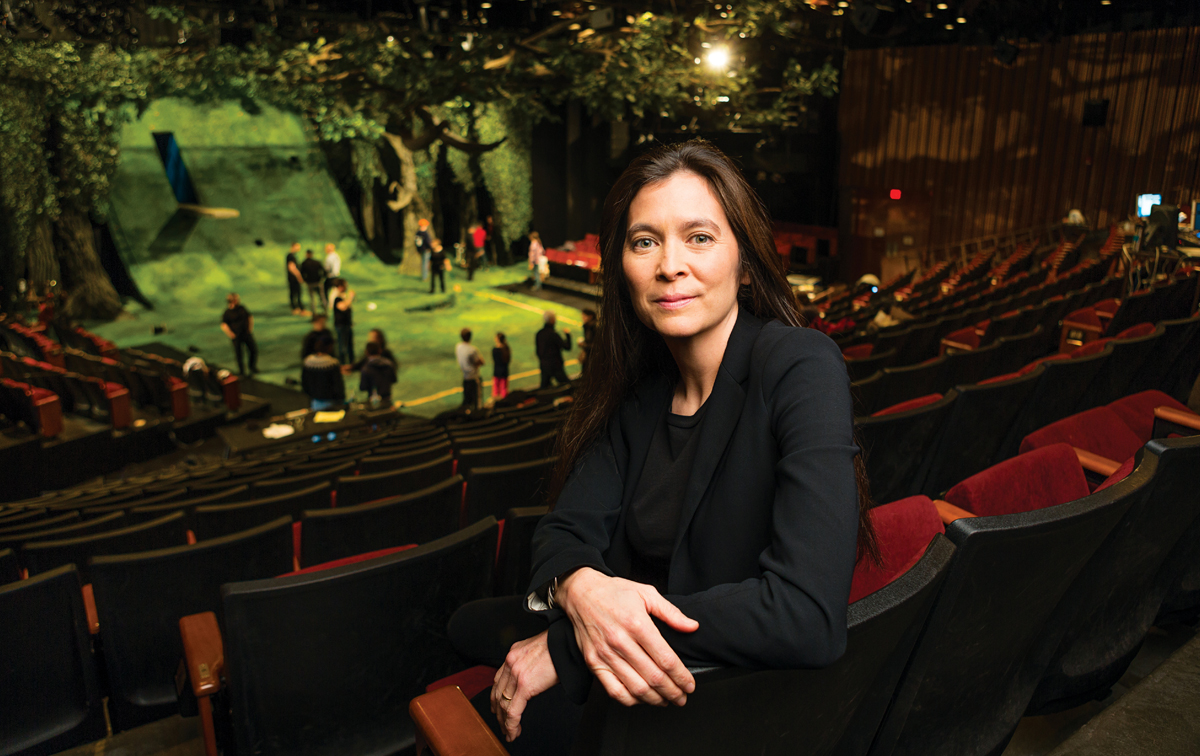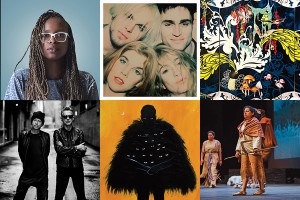Diane Paulus: Drama Queen

Paulus watches over a rehearsal of the ART’s The Heart of Robin Hood. (Photograph by Jason Grow. Hair and makeup by Maryelle O’Rourke/Team.)
Perhaps only someone who grew up immersed in art could be so comfortable navigating, bending, and occasionally breaking its complex rules. If so, Paulus couldn’t have had a more fitting childhood. She was raised on the Upper West Side, a few blocks from Lincoln Center, by parents who loved classical music and opera, and frequently took their kids to see Broadway musicals. Paulus’s earliest theater memory is of marching backstage after a show in Central Park to complain that there were no hippopotamuses in the cast. She was three.
Paulus took piano lessons and studied dance at the School of American Ballet, joined a children’s theater company, and attended Brearley, an exclusive all-girls school. It was there that she met her future husband, Randy Weiner. When an injury sidelined him from the Collegiate School track season, a friend suggested he audition for a role in Wonderful Town at Collegiate’s sister school.
“I was, of course, Policeman Number 6 or Sailor Number 17, and was truly the worst person in the show, to such an absurd degree that I attracted attention from such a glorious creature as Diane, who was of course the best person in the show,” Weiner recalls. “I really fell for Diane, just like everybody falls for Diane. I don’t need to add to the hagiography or whatever the term is for saints, but she’s kind of like a sainted little creature.”
Paulus and Weiner (inseparable since high school except for a short break “so that we could make the choice that felt informed,” she explains) are the proverbial opposite sides of the same coin. He is unfiltered, fast-talking, zany, brash. She is deliberate, focused, and guarded. But they share a zeal for breaking boundaries, loosening conventions, and blurring lines.
With proprietor Simon Hammerstein, Oscar’s grandson, Weiner runs a successful group of über-risqué cabarets called the Box, where patrons who manage to make it past the bouncer hemorrhage cash to see transsexual clowns, Goth sisters performing an act called Twincest, and a stripper pulling a ringing cell phone from her vagina.
Weiner is talking to me via phone from an empty floor in New York’s Seagram Building, chatting a mile a minute while watching a burly circus performer with an 18-foot whip deflower a girl. He’s rehearsing the centerpiece scene from Queen of the Night, a kinky dinner-theater version of Mozart’s The Magic Flute that will immerse audience members in what Weiner, who also attended Harvard, describes as a “dark debutante ball.” With rough sex and leather. Also, food, magic, and circus acts courtesy of the Montreal troupe Les 7 Doigts de la Main, whose cofounder collaborated with Paulus on Pippin.
The show is set to open New Year’s Eve at the Diamond Horseshoe, a legendary Theater District supper club that had been languishing in the basement of the Paramount Hotel since the 1950s. Right now, it’s the middle of the workday and office staffers at the bank building next door are gawking at Weiner’s rehearsal through the windows. “I’ve died and gone to heaven,” Weiner says of the scene. “The absolute perversity of this is so astounding and mind-altering.”
After college, Weiner and Paulus created many theatrical works together. “You can’t imagine how experimental our shows were,” he tells me. As the poster child for theatrical exotica, Weiner is definitely to be trusted here. I can’t imagine. But while Weiner was happy building a lucrative empire of steamy extravaganzas, Paulus attended grad school. Carnality is still a feature of her work, but for her the shedding of clothes and inhibitions isn’t simple titillation. It’s a visceral language for communicating real ideas to the young audience she wants to engage and—avant-garde formalists may want to look away—entertain. After launching The Donkey Show, a co-creation with Weiner that ran off-Broadway for six years, Paulus abandoned the sensual fringes to find more meaningful work.
In 2007, the year before the ART hired Paulus, Oskar Eustis, the 55-year-old artistic director of the venerable Public Theater, in New York, chose her to direct a 40th-anniversary concert of Hair in Central Park. The show became a full production in the park in 2008 and went on to receive critical raves on Broadway and a Tony for best musical revival the following year.
“Diane is breaking down the idea of a work of art or a work of theater as an object or a commodity to be purchased and then passively consumed,” says Eustis, “and that’s something that I think is right in the forefront of the important work happening in the American theater right now. She’s somebody who comes out of an avant-garde theatrical background who nonetheless is deeply interested in reaching masses of people. Diane doesn’t have the sort of high-priestess prejudice of a lot of avant-gardists of my generation, who view with pleasure how few people like their work.”
There is a feeling, even among some Harvard insiders, that Paulus is doing the right thing in the wrong place. Several people, speaking off the record, describe an attitude among locals who are glad that an area theater company is doing the work she’s doing, but wish it weren’t under Harvard’s aegis. Eustis, however, argues that “Harvard is exactly the place” for Paulus: “I would rather have Diane rooted in an institution that constantly is reminding her of nonprofit values and the legacy of human history and cultural values, all the things that are outside the marketplace, but within an environment creating work that can reach a mass of people. That seems to me a pretty exciting combination.”
Paulus counters that her generation of directors must be entrepreneurs as well as artists. “You have to think about why you’re asking an audience to come to the theater,” she says. “It’s not that they should come, because it’s good for them, because it’s the vegetables that they should eat and the culture shot that they should get…. It’s about experience and building community and catalyzing dialogue and bringing people together.” It’s also because theaters need the money.
Peter DuBois, artistic director of Boston’s Huntington Theatre Company, says, “We don’t have the luxury of the Ford Foundation throwing million-dollar grants at theaters, which is what the founding generation of [nonprofit] theaters had. We don’t have a boisterous NEA celebrating experimentation and filling in the holes. You have to be thinking really strategically.”
To keep the ART relevant, Paulus has beefed up cross-discipline collaborations, brainstormed new ticket-packaging ideas, and deepened its ties with the university. She transformed Zero Arrow, its second stage, into Oberon, a club theater that remains home to the ever popular The Donkey Show and serves as a venue for local musicians, drag artists, and burlesque acts.
Paulus has also embraced partnerships with commercial producers, a growing trend in the nonprofit theater world. Such partnerships can account for up to 50 percent of a nonprofit theater production’s budget, according to ART managing director Billy Russo. Commercial alliances aren’t new: Robert Brustein joined forces with Broadway producer Rocco Landesman, who later became chairman of the National Endowment for the Arts, to mount Big River: The Adventures of Huckleberry Finn, which premiered in 1984 at the ART. After a rework at La Jolla Playhouse, it went on to run for more than 1,000 performances on Broadway, win seven Tony Awards, and earn the ART more than $300,000 for staging its premiere. But in recent years working with Broadway producers has gone from something like a dirty little secret to commonplace, and Paulus does it routinely.
“The danger,” Russo says, “is if the theater starts relying on that kind of money for their operational model and for how they’re going to balance the budget, if you start asking, ‘What are the plays out there with money that we can do?’ The theater needs to be saying, ‘This is a production we would be dying to do without the commercial partner.’ And the producer has to want to work with the institution, because it produces the kind of work that would give the project the best development.”


